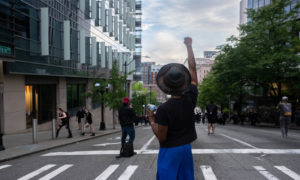Yesterday huge groups of Seattleites got out there in support of immigrant’s human rights and the protection of employees, especially those from underrepresented and vulnerable populations.
Businesses boarded up and clamped down on their doors early in fear of minor property damage. Perhaps due to the legacy of WTO, Seattle seems especially responsive to protests. Or rather, the day of protests. Because the next day and every other day Seattleites, indeed Americans in general, will revert back to their typical role of support services for the wealthy.
In the wake of the clamor of May Day, of cops armed like goofier storm troopers and forceful displays of unity, Seattleites will get up early to go to their job at Starbucks or Nordstrom or Amazon or Google or whatever cancer hospital to earn money to pay back into Starbucks and Nordstrom and Amazon and Google and to all the drug companies getting rich off all the cancer hospitals.
And of course most business activity in the Seattle area barely even had to pause for the day itself.
How can so much noise matter so little?
Because noise doesn’t change things. Money changes things.
No really, that’s the literal function of money; it’s society’s agreed upon store of value. Whoever has the money is the one whose opinions and actions get to have the most value.
Boycotts, city-wide solidarity strikes (which they made illegal when they started to make everything for sale), and tireless blameless acts of civil disobedience like sit-ins make the higher ups look into things. Make them realize that all your fuss will “substantially burden and affect the flow of commerce.” Unfortunately, I don’t think marches that are well coordinated to minimize their impact on the flow of traffic have quite the same affect. As much fun as it was, “checking in” to Standing Rock probably didn’t help much either.
Historically speaking, successful protests are a diverse bunch, but they all share a disruptive element. They become an apparent threat to the status quo, particularly the status quo of the wealthy. And guess who pays a whole lot of attention then?
So go march on May Day. But realize that the once a year people’s party doesn’t do much for the people.
If you’ve read this far you’ve probably figured out how I think you should resist the machine, but I’ll say it anyways: make it difficult for your corporate overlords to rule you. Or at least stop actively supporting their efforts.
Stop giving all your financial support (both through your work and your purchases) to shitty monopolistic enterprises. Find a small grocer to visit, go to the slightly-more-pricey-but-with-better-coffee-that’s-at-least-more-ethical local cafes. Buy your clothes from businesses that don’t suck or, better yet, buy used. Pay attention to boycotts, don’t buy beer that screws with the already shrinking water supply of small scale farmers. You don’t have to be perfect, but you can at least make an effort to shift your purchases in the right direction.
Because maybe that way we can start to actually deserve a parade on May Day.






Comments are closed.